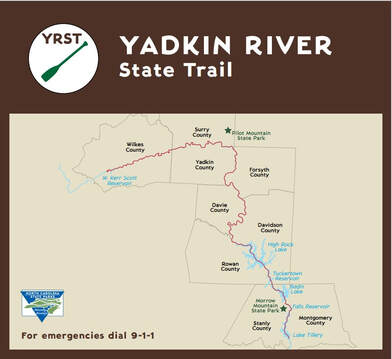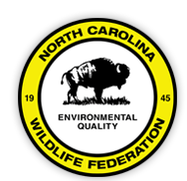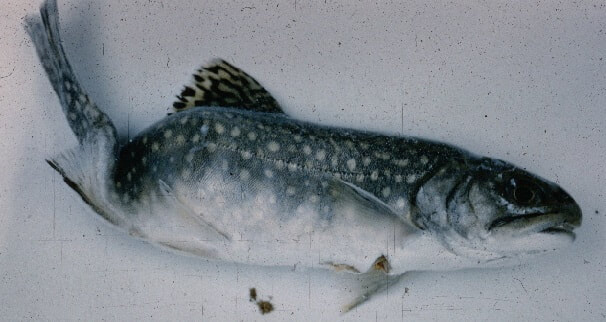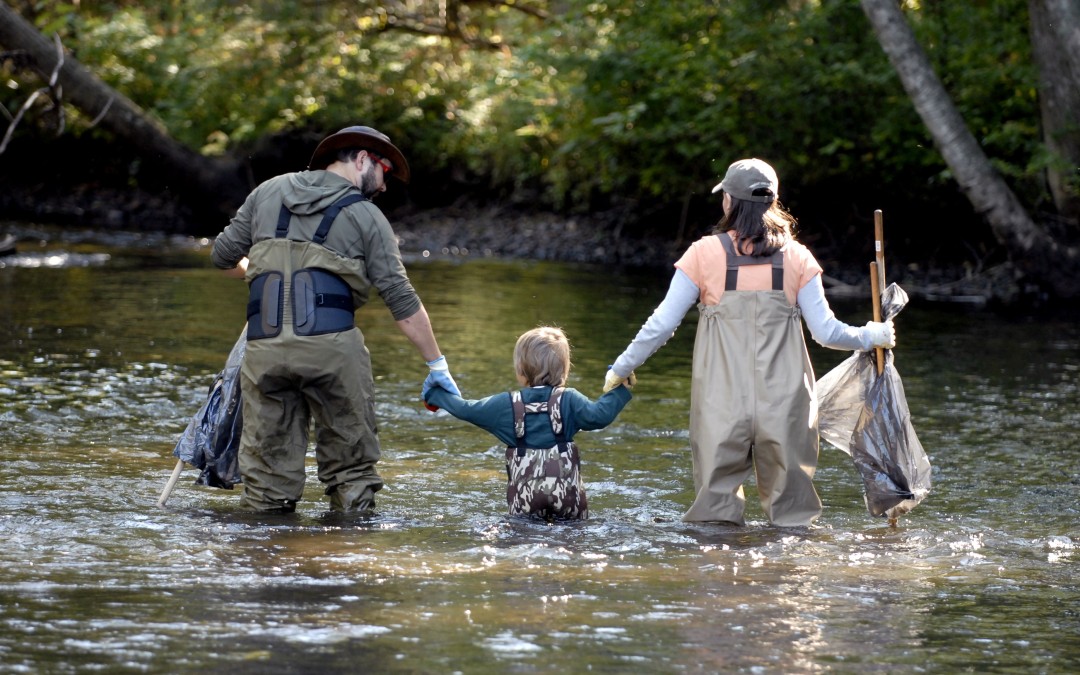Yadkin River Keeper

By Edgar Miller, Riverkeeper/Executive Director, Yadkin Riverkeeper (YRK)
Yadkin Riverkeeper (YRK) and YRK executive director, Edgar Miller, spoke at the January Chapter meeting about how his organization is working to protect and enhance the Yadkin River and its lakes and tributaries. As an affiliate of the international Waterkeeper Alliance, YRK is focused on ensuring the River is drinkable, fishable and swimmable.
Miller noted the River’s headwaters in Watauga, Caldwell, Wilkes and Surry County are some of the most pristine watersheds in the state, but are threatened by development, particularly in the Blowing Rock area, as well as large scale land clearing not adequately regulated by the state. The recent destruction of native brook trout habitat in Ramey Creek in Surry County being a case in point.
Miller reviewed YRK’s 2020 Roadmap to a Cleaner Yadkin report, which includes recommendations and targeted strategies to reduce nonpoint source pollution throughout the Yadkin watershed. The report identifies areas in need of conservation and restoration. It also notes the US Forest Service projects the amount of developed land in the basin will more than double over the next 40 years from 13 percent to 32 precent by the year 2060, making stream restoration and buffer conservation even more critical in the future.
He discussed YRK’s efforts to make improvements to the Yadkin River State Trail (YRST) blueway, including new online and printed maps of the 165-mile long paddle trail designated as a state trial in 1985. Access areas on major tributaries (Roaring, Fisher, Mitchell, South Yadkin and Uwharrie Rivers) are also included. There are currently 17 public access areas on the River portion of the paddle trail and numerous public boat ramps on the Yadkin-Pee Dee Lakes. YRK sponsors a series of historic paddles during the summer months and has been designated as the nonprofit partner with NC State Trails for the YRST. In 2022, YRK will be starting a pilot project of placing mile marker signs along the River in Yadkin County to aid in emergency response. Other major goals are to improve existing access areas and signage and to develop new public access areas every four-to-six miles along the YRST.
YRK is a voice on statewide water quality issues impacting the Yadkin River and advocates for more protective water quality standards and policies to protect the Yadkin River system, which is the drinking water source for nearly 1 million North Carolinians. YRK conducts water sampling on the River and High Rock Lake for nutrients, harmful bacteria and chlorophyll-a and sponsors numerous River and lake cleanups, including the Salem Creek Greenway Cleanup as part of Forsyth County Creek Week this March 19. To learn more about Yadkin Riverkeeper’s work go to their website at https://www.yadkinriverkeeper.org/.
Yadkin River Keeper slides as presented to BRTU.
Keep up with Events for Yadkin River Keeper
Yadkin Riverkeeper (YRK) and YRK executive director, Edgar Miller, spoke at the January Chapter meeting about how his organization is working to protect and enhance the Yadkin River and its lakes and tributaries. As an affiliate of the international Waterkeeper Alliance, YRK is focused on ensuring the River is drinkable, fishable and swimmable.
Miller noted the River’s headwaters in Watauga, Caldwell, Wilkes and Surry County are some of the most pristine watersheds in the state, but are threatened by development, particularly in the Blowing Rock area, as well as large scale land clearing not adequately regulated by the state. The recent destruction of native brook trout habitat in Ramey Creek in Surry County being a case in point.
Miller reviewed YRK’s 2020 Roadmap to a Cleaner Yadkin report, which includes recommendations and targeted strategies to reduce nonpoint source pollution throughout the Yadkin watershed. The report identifies areas in need of conservation and restoration. It also notes the US Forest Service projects the amount of developed land in the basin will more than double over the next 40 years from 13 percent to 32 precent by the year 2060, making stream restoration and buffer conservation even more critical in the future.
He discussed YRK’s efforts to make improvements to the Yadkin River State Trail (YRST) blueway, including new online and printed maps of the 165-mile long paddle trail designated as a state trial in 1985. Access areas on major tributaries (Roaring, Fisher, Mitchell, South Yadkin and Uwharrie Rivers) are also included. There are currently 17 public access areas on the River portion of the paddle trail and numerous public boat ramps on the Yadkin-Pee Dee Lakes. YRK sponsors a series of historic paddles during the summer months and has been designated as the nonprofit partner with NC State Trails for the YRST. In 2022, YRK will be starting a pilot project of placing mile marker signs along the River in Yadkin County to aid in emergency response. Other major goals are to improve existing access areas and signage and to develop new public access areas every four-to-six miles along the YRST.
YRK is a voice on statewide water quality issues impacting the Yadkin River and advocates for more protective water quality standards and policies to protect the Yadkin River system, which is the drinking water source for nearly 1 million North Carolinians. YRK conducts water sampling on the River and High Rock Lake for nutrients, harmful bacteria and chlorophyll-a and sponsors numerous River and lake cleanups, including the Salem Creek Greenway Cleanup as part of Forsyth County Creek Week this March 19. To learn more about Yadkin Riverkeeper’s work go to their website at https://www.yadkinriverkeeper.org/.
Yadkin River Keeper slides as presented to BRTU.
Keep up with Events for Yadkin River Keeper
Piedmont Land Conservancy

Protecting Land Now and for the FutureSince 1990, PLC has protected over 28,000 acres of land, completing over 200 land protection projects. These protected areas include:
Piedmont Land Conservancy’s purpose is to protect these special places to help ensure clean water for our communities, habitat for our wildlife, locally grown food, parks and trails, and other places for people to connect with nature.
Visit Piedmont Land Conservancy
- 9,800 acres added to state parks, turned into nature preserves or now otherwise designed as places to hike, bike, fish and connect with nature.
- 7,600 of farmland protected from development. Change may come, but these acres will remain dedicated to agriculture.
- 10,600 acres of land, adjacent to water resources, now stewarded to protect the water quality of our region.
Piedmont Land Conservancy’s purpose is to protect these special places to help ensure clean water for our communities, habitat for our wildlife, locally grown food, parks and trails, and other places for people to connect with nature.
Visit Piedmont Land Conservancy
NC Wildlife Federation

Since 1945, North Carolina Wildlife Federation has worked for all wildlife and habitat, bringing together conservationists, outdoor enthusiasts, hunters and anglers, government and industry to protect North Carolina’s natural resources. From the Great Smoky Mountains to the Outer Banks, NCWF is a diverse community of people who value wildlife and wild places and the many ways to enjoy them.
Visit NC Wildlife Federation
Visit NC Wildlife Federation
GUIDE TO ACQUATIC INVASIVE SPECIES
|
Due to an increase in anglers from the pandemic--we as guides and outfitters feel it is our duty to step up and help educate. The linked article at the bottom of this paragraph will help, and we are trying to get it out there.
- 54.7 million Americans fished at least once during 2020, the highest number recorded since participation tracking began in 2007 - We offered a survey on invasive species to fly anglers and found out that almost 25% didn't know where to look for info on aquatic invasives and slowing the spread... - Anchor Fly partnered with Linda Vance, Associate Director of the Center for the Rocky Mountain West at the University of Montana. She has written an excellent and actionable article on invasive species as they pertain to anglers. It is geared toward the beginner angler and (among other key info.), outlines what anglers can do to help the spread of aquatic invasives. For the full article, please click here. |
REDUCING THE PRESSURE
|
North Carolina is rich with angling history and holds a special place in the hearts of many anglers who have fished its treasured waters. From mountain streams to large rivers our state is filled with more than 3000 miles of fishing opportunities. However, many of these places are at risk and face a number of pressures from overdevelopment, agriculture, energy development and other stresses. Over the years trout have endured and adapted to threats to their survival. There are many chapters of Trout Unlimited; our goal in this immediate area is taking steps to conserve these at-risk resources and improve habitats to ensure the fish have opportunities to not only survive but thrive.
Click here to read an article about our Conservation in the Mt. Airy News. |
The following are some ways in which our chapter can help...
Stocking of FishThere is always help needed in stocking streams like the Ararat, Mitchell, and Stone Mountain. Organizations like Trout in the Classroom assist NC Wildlife Recourses Commission by raising and releasing trout each spring. Check our information page for upcoming spring release dates.
|
Examination of FishAs you are fishing your favorite spots, keep an eye out for any signs of disease or odd behaviors. The NC Wildlife Resources Commissions asks that you inform them of any signs of gill lice or whirling disease. After your inspection, please release the fish back into the same area as to not spread any diseases!
|
Waste RemovalIf it doesn't belong, just pick it up and take it with you. Removal of trash in and around our streams conserves and beautifies the area for years to come. Add a small trash bag to your list of fishing gear so you'll easily be able to dispose of trash you see along the way.
|
Observe and Communicate...
- Violations - To contact a game warden call:
North Carolina Wildlife at 1-800-662-7137. - Needs - trail runoff due to hiking, mountain bike riding, ATV's, etc. Help build berms.
- Potential destruction from heavy rains, agricultural and industrial runoff.
- Preservation of habitat for wildlife such as hellbender salamander.
- Help in electric shocking in order to tally fish
- Promoting and teaching fly fishing in the schools that have Trout in the Classroom.
- Educate and mentor new trout and nature enthusiasts
Please, click the above banner to learn more about this important initiative!


